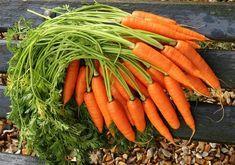
Supplies of English carrots have been coming to a premature end over the last couple of weeks as warmer climes have hit the UK, and that could signal a decent opportunity for French growers, who are now gearing up for their traditional six- to eight-week export season to the UK marketplace.
Simon Lane of Fruco, one of the UK’s largest independent importers of French carrots, believes the planted area in France is down slightly on last year, but it is too early for any accurate predictions as to final volumes. The firm received its first shipment of French product at the end of last week, from the region of Nantes, and as FPJ went to press, Lane was expecting the main growing region of Bordeaux to send its first supplies out.
“Our market is ready for the product,” says Lane. “The warm weather we have had is bringing English carrot supplies to a rapid end, although Scottish will carry on for a few more weeks. We have been taking calls saying English product is not good enough anymore. We loaded our first French carrots at the end of last week from Nantes, which tends to be a slightly earlier area, coming on stream at the start of May with limited volumes.
“Bordeaux then usually kicks in with greater volume and better-quality carrots, and early indications this year are that quality will be good. Timings are roughly in line with what growers and importers expect from an average year.”
Gordon Boggs from exporter Rossmark says that while the crop looks good at this stage in terms of quality, on the volume front it is a bit early to tell. “We will have a better idea later in the month,” he explains. “Having said that, the Landes region overall expects to grow 200,000 tonnes this season.”
Rossmark’s season kicked off two weeks ago with the early crop from the south of the Landes, but all of it is going to the French market, says Boggs. This week, more northern parts of Landes are set to have product available. Rossmark works with three main growers based in the Landes area.
The firm, which is based in Provence near Avignon, supplies mainly wholesalers in the UK, and last year was a fairly low export season for the company. “The UK carrot season over the last few years has lengthened, cutting out volumes of French product required,” says Boggs. “We cannot reasonably say what volumes we will do this season, but what we can say is that the season will be short, and all will depend on when the British new crop starts.
“The UK market is a big part of our business in general terms, i.e. across all products. However, as far as carrots are concerned, other markets are growing fast and taking up the volumes (and more) that the UK is failing to - markets such as Russia and other eastern European countries. The stocks in the Netherlands this year also seem to be much lower than previous years, and we expect good demand from those markets,” says Boggs.
There is undeniably a market in the UK for French carrots, says Lane, but competition on the carrot import scene is fierce, and at any one time there can be product shipped in from as many as nine or 10 different sources. “At any given moment there could be carrots from England, Scotland, France, Italy, Spain, Portugal and even Australia and China in the marketplace,” he says.
The French carrot import season has a firm role to fill in bridging supplies between the UK old and new crops, but its success is wholly dependent on UK supplies. “The length of the market window for French carrots each year depends on UK growers,” says Lane. “They are working harder and harder to get rid of the gap between the old crop and the new crop. But we have imported carrots every year since 1975, so clearly there is a need for French product.
“But ultimately, the length and success of the imported carrot season is governed by the UK crop,” he adds.
According to Lane, two more global issues are also set to make life harder for the French carrot industry in 2008. “There is a big difference in the rate of exchange, which is worrying all of us importing from the euro zone, and there has also been a big increase in transport costs, due to the rising price of fuel. I think it will be an awkward year for costings,” he says.
The British consumer never really knows where the carrots on the store shelves are sourced from, says Boggs. “The French characteristic seems to have little impact. Large volumes are shipped in big bags to packers, who then pre-pack them for the various stores,” he explains. “French product fills a very small window when local production is low. However, over the years, this window has become smaller and smaller.”
But sourcing from France offers many advantages, he argues. “The regular and consistent quality of French carrots, as well as the continuity of supply, are our industry’s main advantages,” he says. “Also, we have cheaper and quicker transport than say, Portuguese or Spanish exporters. Often the price of Italian product is very competitive.”
Lane adds: “I would say that France is the preferred source of imported carrots, both for its proximity and the quality of its product. The French are very switched on when it comes to meeting the demands of the UK market, and are very professional in knowing what we want.”
But the big issues for importers and exporters to watch out for over the next few months are escalating transport costs and the euro-sterling exchange rate. “These are major concerns as we go forward,” adds Lane.